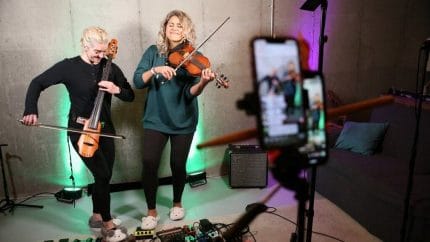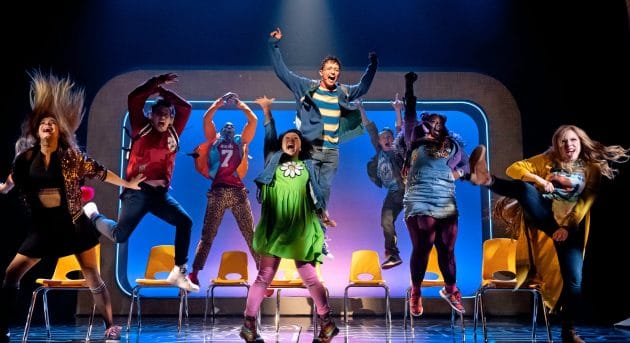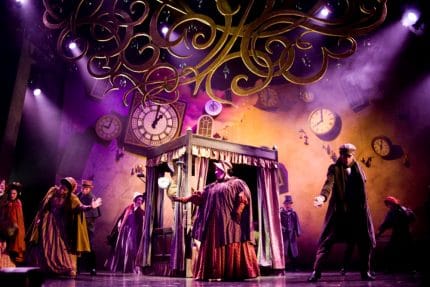Will streaming replace live performance?
There is definitely an argument to be made for live streaming rather than live performances. But will we end up having our musical and theatrical experiences from the comfort of our home? Will coronavirus be the catalyst that makes streaming the new norm?
More inclusive and egalitarian

The Berlin philharmonic orchestra had to suspend live performances in March and began live-streaming in May. Their largest hall has a seating capacity of 2,440. Some of their webcasts and subsequent YouTube videos have been watched by around 300,000 viewers. That’s 297.560 more viewings, which isn’t taking into account the fact that live streaming can be watched by multiple people from a single screen.
Live broadcasts also make performances more inclusive and egalitarian. Take for example the cost to see a top play at London’s National Theatre. The ticket itself is beyond the financial means of many people. Then for many, there’s also the cost of travelling too and staying in London. Live broadcasts mean that audiences anywhere in the world can enjoy a musical or play by watching it from anywhere they can find a wifi connection. This meant that cost and time were considerably reduced for the viewers. Since lockdown, audiences around the world have had the opportunity to watch some of the world’s best theatre without leaving the comfort of their own home.
When lockdown is a thing of the past, there will still be a group of people that won’t be able to get to a theatre or arts centre. Perhaps health prevents them, or they have young children. Perhaps they do shift work and are less flexible. When he was aged and mostly housebound, the late Andre Previn said, “A day without music is a day wasted.” If you can’t experience it live, then streaming brings the performance to you.
There’s nothing like the live experience

Streaming just can’t replace that intimacy, the energy, the feeling of being involved in a live show. Of sharing that experience with everyone else in the venue. You might not even like the opera happening in front of you, but you can still enjoy the atmosphere, the communal laughing or crying. A person is far less likely to walk out of a live performance as they are to switch off the tv or close down the computer. They might, therefore, miss out on having a new, live experience.
Isn’t part of the fun of a concert or performance in the anticipation? Who gets dressed up to watch a concert from their settee? Then there are the drinks afterwards to chew the cud about the experience. I believe this is much nicer than switching off the television/computer and heading straight to bed.
The Shakespeare Globe Theatre in London’s Read not Dead performances are an amazing testament to the importance of live theatre. Actors rehearse the play once and present it, script in hand, to an audience later that day. As the Globe itself says;
The performances are instinctive, adrenaline-driven and inventive.
That ambience cannot be felt in the same way on a television screen or macbook pro with the latest noise cancelling airpods. The theatre is so small the audience can almost touch the actors. You can see the subtle face movements, impromptu humour, the quick searching for what’s next. The suspense of the actors, on the other side of the stage, anticipating their next moves. There is so much skill and virtuosity which a camera cannot pick up.
No one applauds at the end of a film. Everyone applauds at a theatre or a concert venue, sometimes with cheering, a standing ovation and encores. This is all part of the live, interactive response of a live performance.
How many music lovers have been disappointed when purchasing a CD after a live performance? However good the recording equipment, recorded classical music always feels flatter than in person. The actual painting is always more powerful than the reproduction. Why else bother going to a museum to see Leonardo’s original Mona Lisa or Monet’s Waterlilies? The silence between the notes at a concert of Ludovico Einaudi can be heard when streamed, but much more beautifully live.
Neither either or
It looks like there is a case for both streaming and live performances. Both have a role to play. Streaming is a sort of digital add-on to one’s physical experience. It has a place and probably will play a larger role in our lives post lockdown. But it will never replace a live theatrical experience.
Not to mention the financial cost to the producers. Streaming content post lockdown have largely been free of charge with the encouragement of a donation to aid the ailing venue or production companies. Performers and stage crew, who albeit love their craft, also need to pay their bills.
A typical loyal UK theatre-goer, Hilary Cox, believes that streaming won’t replace live performances. She said the following;
Streaming, to me compliments but doesn’t replace live performances…. People who love live performances will be back buying tickets and supporting their favourite styles. During lockdown, they are enjoying the streaming which is keeping them involved and engaged, but also reminding them of what they are missing.
The performing arts have entertained us as far back we can trace in history. To quote Plato:
Music gives a soul to the universe, wings to the mind, flight to the imagination, and life to everything.
I wonder what he would have said if he had the option of streaming when housebound while the world was dealing with a virus?





